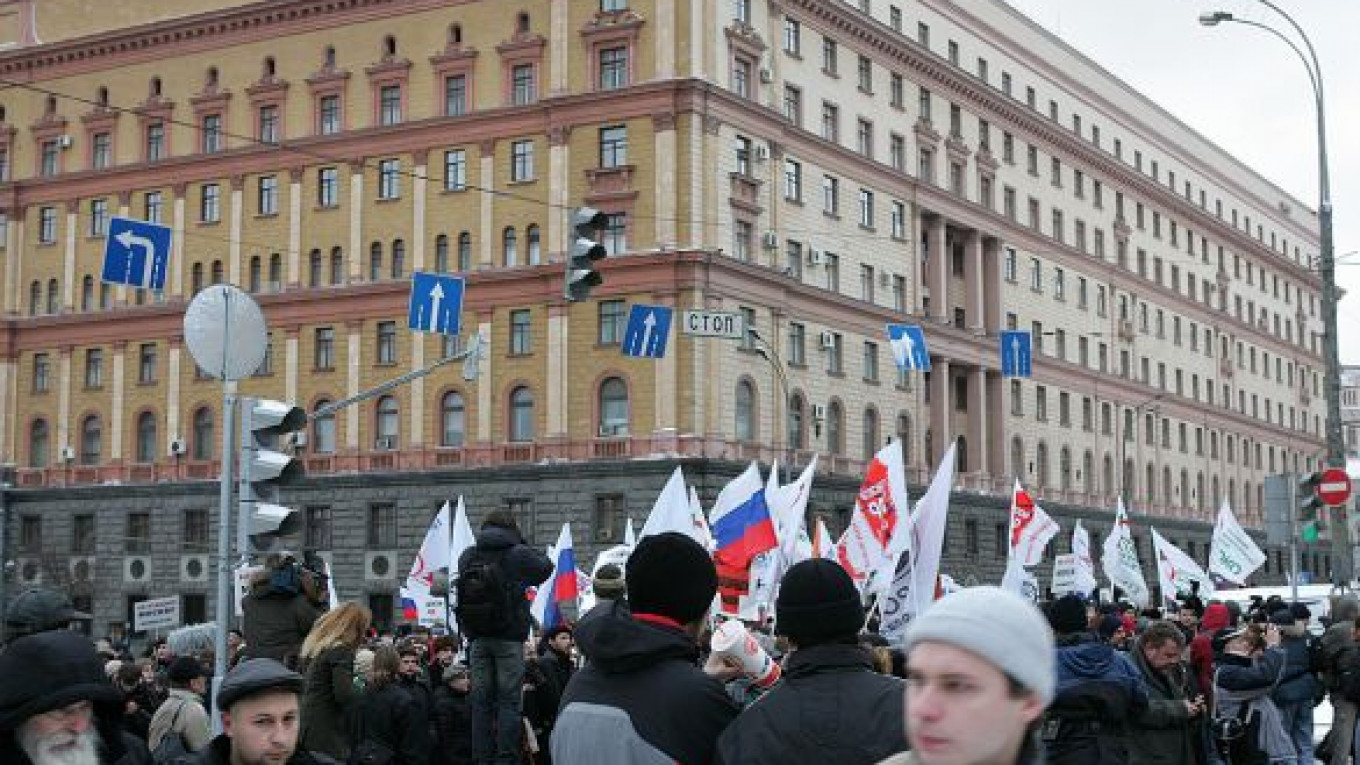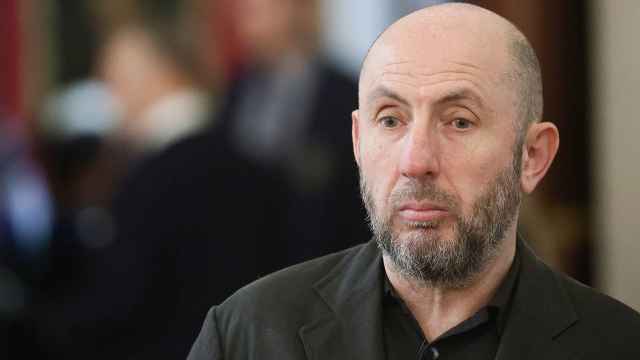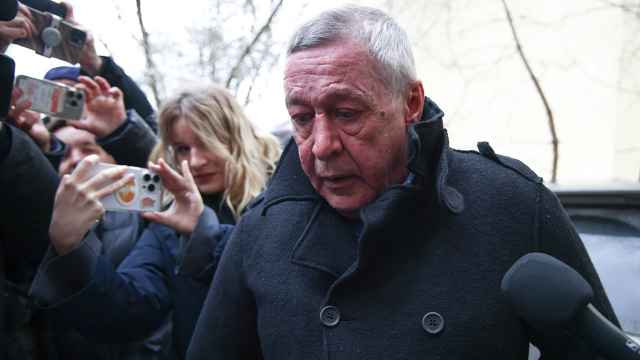Since the ascent of Vladimir Putin a decade ago, many hands have been wrung down to the bone in the West over his KGB pedigree and the array of spooks that have joined Russia’s ruling class under his watch. For some excitable critics of the current government, the mere fact of Putin’s service to one of the more ruthless security agencies in modern history is indisputable evidence of his sinister nature and unwavering commitment to restoring a totalitarian state and a menacing security apparatus to safeguard it. The KGB is evil; Putin is KGB; ergo Putin is evil. So goes the supposition.
Fortunately there are inquisitive and intrepid journalists like Andrei Soldatov and Irina Borogan to bring nuance, analysis and old-fashioned shoe-leather reporting to the subject of the revival of Russia’s security services. In their new book “The New Nobility,” Soldatov and Borogan — co-founders of the Agentura.ru web site — provide a sober look at the increasing influence of the KGB’s main successor, the Federal Security Service, or FSB, on the country’s affairs under Putin.
Relying primarily on first-hand reporting they did for a variety of publications — including the influential opposition biweekly Novaya Gazeta — the authors pull no punches in their criticism of endemic corruption and incompetence in the country’s security forces. But they do so with a refreshing lack of hysteria, drawing conclusions from facts they were able to document and refusing to indulge in conspiracy theory.
The book draws its title from a description of his subordinates given by erstwhile FSB chief Nikolai Patrushev in a 2000 newspaper interview. The agencies ranks include “highbrow intellectual analysts,” “broad-shouldered, weather-beaten special forces men,” “taciturn explosives specialists,” and “discreet counter-espionage” officers, Patrushev beamed. “They all look different, but there is one very special characteristic that unites all these people … : It is their sense of service.”
Patrushev’s ebullience was understandable. Russia’s security services had been largely castrated in the 1990s by Boris Yeltsin, who divvied up the former KGB into various agencies in order to play them against one another. In Putin, they now had one of their own running the country. And over the next decade, the authors note, Putin brought much of the former KGB under the auspices of Patrushev’s agency, while “former and current security service agents permeated the ranks of business and government structures.”
Along with their new status, of course, came spoils — including expensive real estate on the prestigious Rublyovo-Uspenskoye Shosse in western Moscow. In contrast to Soviet times, when the KGB merely loaned these properties to its officers, this land — some of the most expensive in Russia — has been handed over to FSB officials for a song.
In one of the book’s more entertaining sections, the authors investigate this naked land-grab and the futile attempts of independent State Duma deputy Viktor Alksnis to challenge such deals, which had outraged his constituents in the area. When the authors pressed authorities for an explanation, they were told the land was doled out under a law meant to provide modest housing to security service veterans. Alksnis’ voters weren’t the only ones incensed, apparently. In a hilarious twist, Soldatov and Borogan discover that several FSB officers had appealed to the European Court of Human Rights in Strasbourg with claims of discrimination over their bosses’ access to such perks.
If you live in Russia — or follow its politics — long enough, you learn to shake your head and chuckle at such hijinks. And Soldatov and Borogan delve into plenty of similar light fare associated with the security services’ growing power in the Putin era — including the infamous 2006 “spy rock” scandal involving British diplomats in Moscow and the bizarre tale of Alexander Novikov, who claimed that he was an FSB plant in Garry Kasparov’s opposition group and subsequently sought political asylum in Denmark. But the authors tackle the serious as well, most notably in several chapters devoted to Russia’s response to the terrorist attacks, organized by Chechen rebels, on the Dubrovka theater in 2002 and School No. 1 in Beslan in 2004.
Soldatov and Borogan reported from the ground during both of these horrifying attacks, and their accounts in this book are as gripping as they are incisive — conveying the tension and chaos as security forces attempt to free hundreds of hostages. In the Dubrovka crisis, Russia’s “frightening lack of preparedness for a grave hostage situation” led to more than 100 deaths, largely because medical personnel had not been properly mobilized to handle the aftermath, they conclude.
In Beslan, shoddy organization proved deadly as well, with no visible chain of command controlling the operation to free the parents, teachers and children held in the school by terrorists. About an hour after the gunfire started, the authors saw Eduard Kokoity, president of the breakaway republic of South Ossetia, giving orders to Russian troops. “He was the president of another country, but he was one of the people making decisions,” they write. No senior officials were punished for either debacle. Indeed, many received medals or promotions.
To be sure, “The New Nobility” has its flaws. There are stabs at broad conclusions that seem rushed and included only as afterthoughts, and in spots the authors jump from subject to subject with little sense of a narrative thread — like following a chapter about FSB propaganda with a section about secret KGB tunnels under the streets of Moscow. But the sheer volume of original reporting on Russia’s security service — which has landed both Soldatov and Borogan in criminal probes by the FSB — is remarkable.
Those seeking anti-Kremlin diatribes or a categorical denunciation of the country’s increasingly powerful security services will be disappointed by this book. If there is one overarching theme, it is not that the FSB is an inherently insidious entity. It is that in a healthy society, an organization entrusted with so much authority over the public’s well-being must be accountable in some way to the public itself.
A Message from The Moscow Times:
Dear readers,
We are facing unprecedented challenges. Russia's Prosecutor General's Office has designated The Moscow Times as an "undesirable" organization, criminalizing our work and putting our staff at risk of prosecution. This follows our earlier unjust labeling as a "foreign agent."
These actions are direct attempts to silence independent journalism in Russia. The authorities claim our work "discredits the decisions of the Russian leadership." We see things differently: we strive to provide accurate, unbiased reporting on Russia.
We, the journalists of The Moscow Times, refuse to be silenced. But to continue our work, we need your help.
Your support, no matter how small, makes a world of difference. If you can, please support us monthly starting from just $2. It's quick to set up, and every contribution makes a significant impact.
By supporting The Moscow Times, you're defending open, independent journalism in the face of repression. Thank you for standing with us.
Remind me later.






